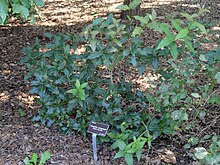Osmanthus yunnanensis
| Osmanthus yunnanensis | |
|---|---|

| |
| JC Raulston Arboretum, North Carolina, USA | |
| Scientific classification | |
| Kingdom: | Plantae |
| Clade: | Tracheophytes |
| Clade: | Angiosperms |
| Clade: | Eudicots |
| Clade: | Asterids |
| Order: | Lamiales |
| Family: | Oleaceae |
| Genus: | Osmanthus |
| Species: | O. yunnanensis
|
| Binomial name | |
| Osmanthus yunnanensis | |
Osmanthus yunnanensis is a species of flowering plant in the olive family Oleaceae, native to Yunnan and Sichuan in the far south west of China. Growing to 12 m (39 ft) tall and broad, it is an evergreen shrub or small tree with leathery oval leaves, which may be flat or undulate. In winter and spring, small clusters of white flowers in the leaf axils produce an intense fragrance.[3]
This plant was introduced to Britain by the Scottish botanist and planthunter George Forrest in 1927. Despite originating in a subtropical region, Osmanthus yunnanensis has proved to be hardy throughout most of the UK, down to about −15 °C (5 °F). There is a thriving specimen in St Andrews Botanic Garden in south east Scotland.[4] It has gained the Royal Horticultural Society's Award of Garden Merit.[5][6]
Etymology
[edit]Osmanthus is derived from Greek and means 'fragrant flower'.[7]
Yunnanensis means 'from Yunnan Province, China.'[7]
References
[edit]- ^ "Osmanthus yunnanensis". The Plant List. Retrieved 14 April 2018.
- ^ "Osmanthus yunnanensis". International Plant Names Index. Retrieved 14 April 2018.
- ^ "Architectural Plants - Osmanthus yunnanensis". ArchitecturalPlants. Retrieved 14 April 2018.
- ^ "Plant of the month, December 2008: Osmanthus yunnanensis". St Andrews University. Retrieved 14 April 2018.
- ^ "RHS Plantfinder - Osmanthus yunnanensis". Retrieved 14 April 2018.
- ^ "AGM Plants - Ornamental" (PDF). Royal Horticultural Society. July 2017. p. 70. Retrieved 14 April 2018.
- ^ a b Gledhill, David (2008). "The Names of Plants". Cambridge University Press. ISBN 9780521866453 (hardback), ISBN 9780521685535 (paperback). pp 285, 410
